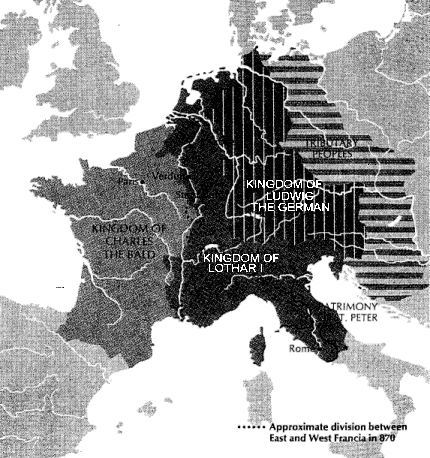
THE FRANKISH KINGDOMS AFTER CHARLEMAGNE
The Beginnings
of Germany, France and Lorraine:
THE STRASSBURG OATHS
OF
A.D. 842 FEBRUARY 14
by
Modern Europe began on a wintry day over eleven and a half centuries ago, in the city of Strassburg, with the alliance of two brothers against a third. The chief dramatis personæ were six:
| 1. | Charlemagne(A.D. 742-814) |
King of the (Germanic nation of the) Franks, 768-814, founder and emperor (800-814) of the Holy Roman Empire (800-1807); son of the Frankish king Pippin the Short (714-768) and grandson of the Frankish king Karl Martell ("the Hammer," i.e., of the Muslim Saracens; 689-741) |
| 2. | Ludwig the Pious (A.D. 778-840) |
Son of Charlemagne and co-regent with him (813-814), then sole emperor of the Holy Roman Empire until death in 840. |
| 3. | Ludher (A.D. 795-855) |
Eldest son of Ludwig the Pious by the latter's first wife, and Holy Roman Emperor (840-855), king of the middle third of the Empire from Frisia to Italy, inclusive. |
| 4. | Ludwig the German (A.D. 804-876) |
Third son of Ludwig the Pious by the latter's first wife, and king of the East Franconian (i.e., basically German), eastern third of the Empire. |
| 5. | Karl the Bald (A.D. 823-877) |
Fourth son of Ludwig the Pious - by the latter's second wife, and king of the West Franconian (i.e., basically French), western third of the Empire. Holy Roman Emperor 875-877. |
| 6. | Nidhard (A.D. 795?-844) |
Grandson of Charlemagne through the latter's daughter Berhta's premarital liaison with Angilberht, Charlemagne's secretary of state. Famous Frankish historian. |
Lothair's (Lūdhēr's) name is still preserved in the name of the land which was once his: German Lothringen, French Lorraine, both from Lūdhēringen, "Land of Lūdhēr," "Lūdhēr's Belongings." Tragically, it has remained a source of contention between France and Germany since the day on which the Strassburg Oaths were sworn.
The two younger men - Ludwig as king of Germany and Karl as king of France - combined against Ludher in 842 and at the city of Strassburg swore the following oaths of mutual defense against their brother. The alliance sealed by these oaths is to this day viewed as a prototype for German-French unity; and its symbolism is the reason why so many Franco-German and pan-European congresses, joint announcements, treaty-signings and the like are still held in this city.

The only account of the events which led to the swearing of these oaths is contained in the Historiarum libri quattuor of Nīdhard (or Nīthard), a contemporary and yet fourth grandson of Charlemagne. This account, which inter alia contains the oldest connected linguistic monument of Old French, is preserved in a single manuscript of the tenth or eleventh century, now in Paris. There the alliance is thus described:
|
|
Ergo (ante diem) XVI (sextum decimum) Kalend(as) Mart(ias), Lodhwicus et Karolus in civitate, quæ olim Argentaria vocabatur, nunc autem Strazburg vulgo dicitur, convenerunt, et sacramenta, quæ subter notata sunt, Lodhwicus Romana, Karolus vero Teudisca lingua juraverunt. |
Therefore on the 16th day before the Calends of March (i.e., February 14th) [A.D. 842], Ludwig and Karl met in the city which was formerly called Argentaria, but now in the venacular tongue Strassburg, and swore the oaths which are written below - Ludwig in the Romance (i.e., Old French, actually Proto-French, the earliest recorded "French"), but Karl in the German language [specifically, in the Rhenish Franconian dialect of Old High German]. |
|
Ac sic ante sacramentum, circumfusam plebem alter Teudisca, alter Romana lingua allocuti sunt. |
But before the oaths, they addressed the people gathered around, the one in the German, the other in the Romance tongue. |
|
Lodhwicus autem, quia major natu, prior exorsus sic cœpit: « Quotiens Lodharius me et hunc fratrem meum », etc. |
Ludwig [the German ruler], namely, because he was the elder, began first thus: “How often Ludher me and my brother here,” etc. |
|
Quumque Karolus hæc eadem verba Romana lingua perorasset, Lodhwicus, quoniam major natu erat, prior hæc deinde se servaturum testatus est : |
When Karl [the French ruler] had spoken the same words in the Romance language, Ludwig, because he was the elder, swearing first, swore that henceforth he would hold to these things: |
|
Pro deo amur et For God's love (= for the love of God) and |
|
Quod quum Lodhwicus explesset, Karolus Teudisca lingua sic hæc eadem verba testatus est : |
When Ludwig [the German ruler] had finished this, Karl [the French ruler] swore these same words in the German language thus: |
KARL'S OATH
|
|
Sacramentum autem, quod utrorumque populus, quique propria lingua, testatus est, Romana lingua sic se habet : |
The oath, however, which the people of both swore, each in its own language, is in the Romance tongue thus: |
THE OATH OF KARL'S FRENCH TROOPS
|
| Theudisca autem lingua : | But in the German tongue: |
THE OATH OF LUDWIG'S GERMAN TROOPS
|
|
Quibus peractis, Lodhwicus Rhenotenus per Spiram et Karolus juxta Wasagum per Wīzzūnburg Warmatiam iter direxit. |
When these things were over, Ludwig [the German ruler] made his way downstream along the Rhine through Speyer and Karl [the French ruler] his along the Vosges through Weissenburg to Worms. |
*** Etymology of the Main Names ***
Charlemagne
- Modern German Karl der Große, Latin Cárolus Magnus, lit., "Big Guy"; Karl/Charles = English churl; French Charles.Lūdwīg - Old High German Hlūd-wīg ["Famed of Battle"], modern English/French Louis
Lūdhēr - Old High German Hlūd-Hæri ["Famed of Army"], German Lothar, modern English Lothair.
Nīdhard - Old High German Nīdhard ["Severe in Anger"], usually spelled in more southern dialect form as Nīthard, but modern German Neidhart beside Neithard.
Click here to send me e-mail.
Klicken Sie hier, um mich per e-mail zu erreichen.
| » | » | » | TOP | « | « | « |